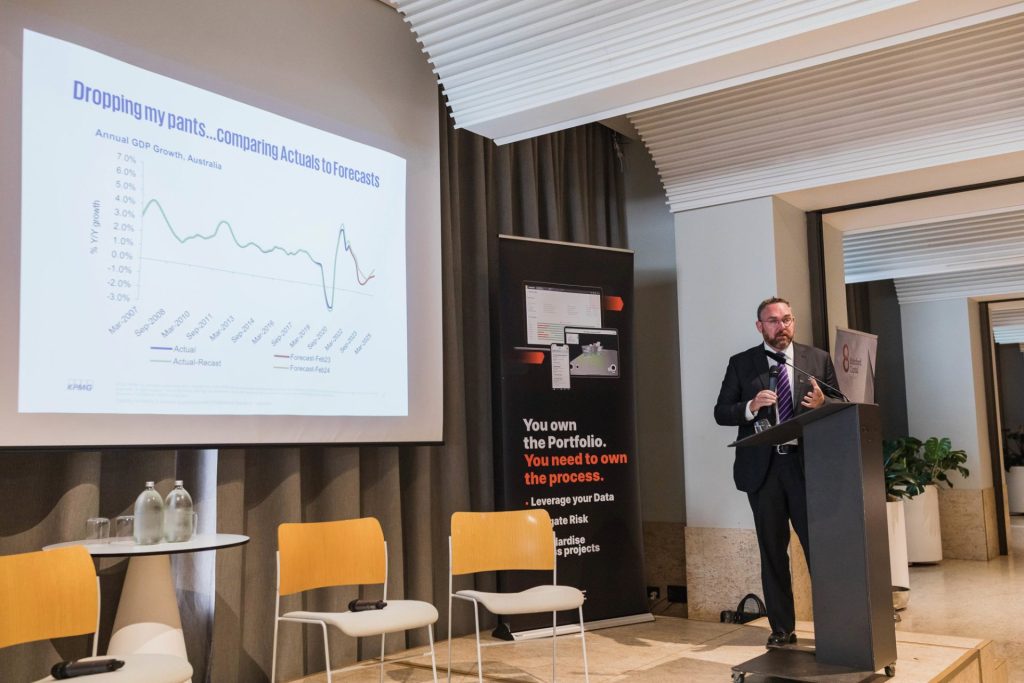
In the ever-evolving world of property, staying informed of the latest economic analyses and forecasts is essential. Recently, Dr. Brendan Rynne, Chief Economist at KPMG Australia, shared valuable insights and reflections on economic forecasts from the previous year, shedding light on the current economic outlook and its implications for the property market.
Reflecting on the Past: Insights and Surprises
Dr. Rynne’s retrospective analysis delved into his previous predictions, highlighting notable disparities between projections and actual outcomes. Key areas such as business investment, housing, cash rates, government bonds, US dollars, and dwelling prices revealed intriguing discrepancies. One standout factor was the underestimated impact of net overseas migration, significantly influencing demand and inflation dynamics. Despite meticulous forecasting, unforeseen variables often reshaped economic trajectories, prompting a re-evaluation of predictive models and methodologies.

The Impact of Migration and Housing Demand
The influx of migrants, particularly in cities like Brisbane, triggered a surge in housing demand, propelling prices to unprecedented levels. The rental market witnessed a corresponding strain as limited supply escalated rental prices, reflecting the intricate interplay between migration patterns and housing market dynamics. Dr. Rynne emphasised the need for adaptable urban planning and infrastructure development to accommodate evolving population trends while mitigating housing affordability challenges.
Navigating the COVID-19 Effect
The COVID-19 pandemic sparked a unique economic landscape, leaving many households with surplus savings. However, Dr. Rynne noted the unequal distribution of these benefits and underscored the importance of equitable tax policies to address economic disparities effectively. The pandemic’s enduring legacy underscores the imperative for resilient economic frameworks capable of withstanding disruptive shocks while promoting inclusive growth and social cohesion.
Looking Ahead: Forecasts and Considerations
Dr. Rynne’s predictions for the next six months anticipate subtle shifts: stagnant consumption, improved housing investment, decreased business expenditure, sustained government support, reduced unemployment rates, and modest inflation. However, he cautioned against unchecked government spending, emphasising the necessity of sustainable fiscal policies. Proactive measures such as targeted stimulus initiatives and investment in education and infrastructure can bolster economic resilience and foster long-term prosperity in the face of uncertainty.
Navigating the Economic Puzzle
Dr. Rynne’s analysis underscores the multifaceted nature of economic dynamics, influenced by demographic trends, policy interventions, and market forces. As stakeholders in the property market, understanding these complexities is the key to making informed decisions amidst uncertainty. By leveraging data-driven insights and adopting a holistic approach to economic management, policymakers, investors, and businesses can navigate the evolving economic landscape with confidence and agility.
Dr. Brendan Rynne’s insights provide a valuable roadmap for navigating the intricate landscape of property in 2024 amidst evolving economic trends. By staying informed and adaptable, you can harness opportunities and mitigate risks in an ever-changing environment. Amidst the complexities of economic trends and property dynamics, the team at Cohen Handler Queensland remain steadfast in keeping you informed and empowered. Our goal is to offer guidance and support as we navigate the twists and turns of the property market together.
